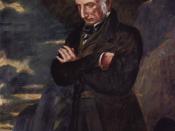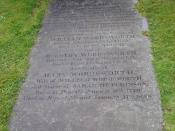An individual's hometown is one of the most important ties that a person can have. Memories of all sorts can be placed in the area that someone had grown up in. However, changes occur, and being absent for a period of time helps the individual realize these changes. William Wordsworth displays this realization in the sonnets, "Composed Upon a Westminster Bridge" and "London, 1802."
"Westminster Bridge" reveals Wordsworth's feeling of leaving his hometown of London. In the octave, Wordsworth personifies the elements of London as the "beauty of the morning" rises up over the buildings as if they were "open unto the fields, and to the sky." Already feeling homesick, Wordsworth comments on how London seems to be reaching towards heaven and describes how the city seems fresh and unpolluted at dawn, when London seems to still be asleep. The sestet continues on to reveal London in a more romantic form.
At dawn, the sun rises "in his first splendor" while the river "glideth at his own sweet will"; the area seems so calm that "the very houses seem asleep." The author's overall tone of awe and content portrays London as a peaceful, calm, almost heavenly environment.
Wordsworth's sonnet, "London, 1802", focuses on London's digressive condition upon his return from Paris. In the octave, he calls out to John Milton (author of Paradise Lost) to tell him how England has turned into a "fen of stagnant waters" and that the metonymic clergy, military, arts, commoners, and the wealthy had all "forfeited their ancient English dower" of spirituality. The people of England had turned more materialistic over the years, losing their focus on religion and lack of being a civilized country. Nature is used in the sestet to further describe how Milton's "soul was like a...


